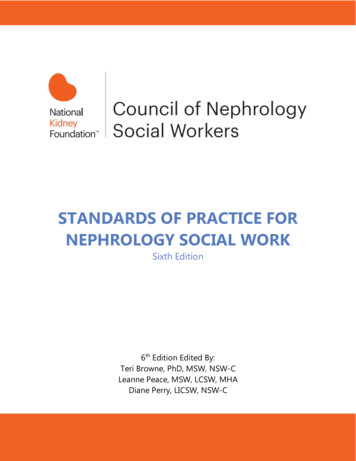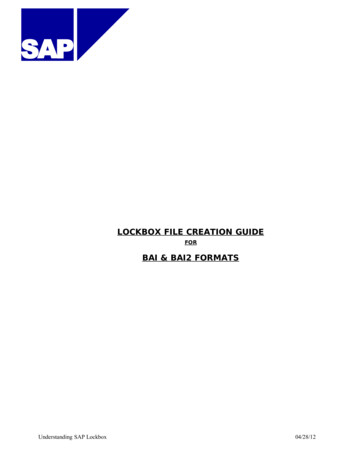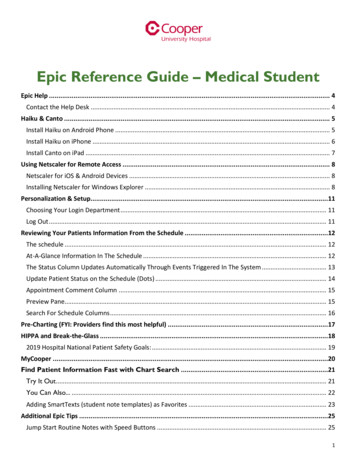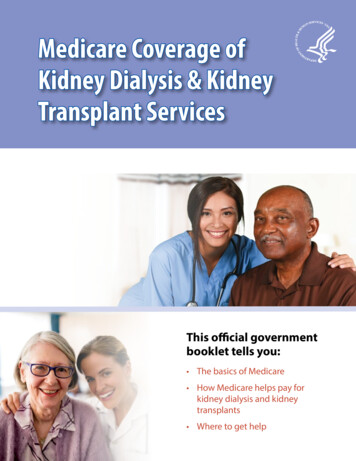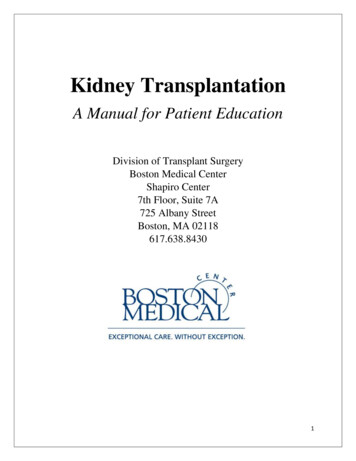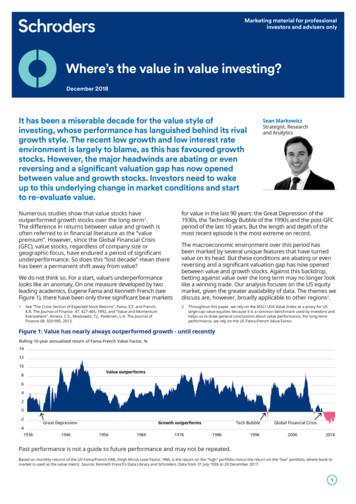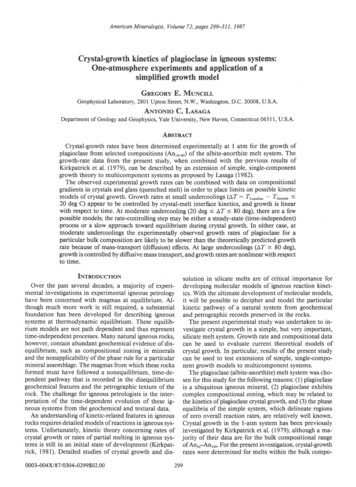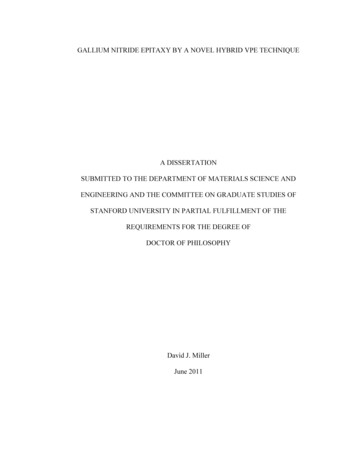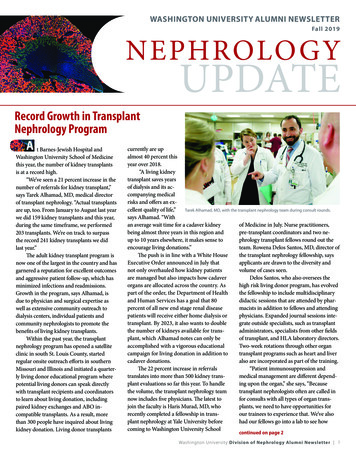
Transcription
WASHINGTON UNIVERSITY ALUMNI NEWSLETTERFall 2019NEPHROLO GYUPDATERecord Growth in TransplantNephrology ProgramA t Barnes-Jewish Hospital andcurrently are upWashington University School of Medicinethis year, the number of kidney transplantsis at a record high.“We’ve seen a 21 percent increase in thenumber of referrals for kidney transplant,”says Tarek Alhamad, MD, medical directorof transplant nephrology. “Actual transplantsare up, too. From January to August last yearwe did 159 kidney transplants and this year,during the same timeframe, we performed203 transplants. We’re on track to surpassthe record 241 kidney transplants we didlast year.”The adult kidney transplant program isnow one of the largest in the country and hasgarnered a reputation for excellent outcomesand aggressive patient follow-up, which hasminimized infections and readmissions.Growth in the program, says Alhamad, isdue to physician and surgical expertise aswell as extensive community outreach todialysis centers, individual patients andcommunity nephrologists to promote thebenefits of living kidney transplants.Within the past year, the transplantnephrology program has opened a satelliteclinic in south St. Louis County, startedregular onsite outreach efforts in southernMissouri and Illinois and initiated a quarterly living donor educational program wherepotential living donors can speak directlywith transplant recipients and coordinatorsto learn about living donation, includingpaired kidney exchanges and ABO incompatible transplants. As a result, morethan 300 people have inquired about livingkidney donation. Living donor transplantsalmost 40 percent thisyear over 2018.“A living kidneytransplant saves yearsof dialysis and its accompanying medicalrisks and offers an excellent quality of life,”Tarek Alhamad, MD, with the transplant nephrology team during consult rounds.says Alhamad. “Withan average wait time for a cadaver kidneyof Medicine in July. Nurse practitioners,being almost three years in this region andpre-transplant coordinators and two neup to 10 years elsewhere, it makes sense tophrology transplant fellows round out theencourage living donations.”team. Rowena Delos Santos, MD, director ofThe push is in line with a White Housethe transplant nephrology fellowship, saysExecutive Order announced in July thatapplicants are drawn to the diversity andnot only overhauled how kidney patientsvolume of cases seen.are managed but also impacts how cadaverDelos Santos, who also oversees theorgans are allocated across the country. Ashigh risk living donor program, has evolvedpart of the order, the Department of Healththe fellowship to include multidisciplinaryand Human Services has a goal that 80didactic sessions that are attended by pharpercent of all new end stage renal diseasemacists in addition to fellows and attendingpatients will receive either home dialysis orphysicians. Expanded journal sessions intetransplant. By 2023, it also wants to doublegrate outside specialists, such as transplantthe number of kidneys available for transadministrators, specialists from other fieldsplant, which Alhamad notes can only beof transplant, and HLA laboratory directors.accomplished with a vigorous educationalTwo-week rotations through other organcampaign for living donation in addition totransplant programs such as heart and livercadaver donations.also are incorporated as part of the training.The 22 percent increase in referrals“Patient immunosuppression andtranslates into more than 500 kidney transmedical management are different dependplant evaluations so far this year. To handleing upon the organ,” she says, “Becausethe volume, the transplant nephrology teamtransplant nephrologists often are called innow includes five physicians. The latest tofor consults with all types of organ transjoin the faculty is Haris Murad, MD, whoplants, we need to have opportunities forrecently completed a fellowship in transour trainees to experience that. We’ve alsoplant nephrology at Yale University beforehad our fellows go into a lab to see howcoming to Washington University Schoolcontinued on page 2Washington University Division of Nephrology Alumni Newsletter 1
Message from the ChiefIt gives me greatpleasure to share newsthat Tarek Alhamad,MD, Medical Director of Kidney andPancreas Transplant,will receive an Awardof Excellence from the National KidneyFoundation serving Eastern Missouri, Metro East, and Arkansas. The award, the localfoundation’s highest honor, recognizes individuals for their outstanding accomplishments towards the awareness, preventionand treatment of kidney disease. Tarek alsois honored for his advocacy efforts that haveheightened awareness of organ allocationpolicies and outreach.The recognition comes at a time whena White House Executive Order announcedearlier this year is creating an increasedemphasis on living donor transplant as wellas on home dialysis. The aim is to improvethe care of patients with kidney disease —good news because an estimated 37 millionpeople in this country have chronic kidneydisease and more than 600,000 are diagnosed with kidney failure. I am very gratefulthat our new faculty member and formerAdministrative OfficeDivision of NephrologyWashington UniversitySchool of MedicineCampus Box 8126600 South Euclid Ave.St. Louis, MO 63110Phone: 314-362-8232Fax: 314-362-8237Consultations &Appointments:Patient Appointments314-362-7603Patient referrals800-867-3627FellowshipProgram:Steven Cheng, MDProgram Directorstcheng@wustl.eduSeth Goldberg, MDAssociate ProgramDirectorsgoldber@wustl.eduTingting Li, MDAssociate ProgramDirectorClinical Research andCareer Mentorshiptingli@wustl.eduRowena Delos Santos,MDDirector, NephrologyTransplant Fellowshipdelossantos@wustl.eduOn the web:Website: nephrology.wustl.eduTwitter: twitter.com/WUNephrologyFacebook: www.facebook.com/WUNephrology2trainee Dr. Anubha Mutneja is our newDirector of Home Modalities. We haveseen tremendous growth in patients choosing to pursue home modalities recently.Dr. Mutneja has many great ideas – staytuned for some exciting developments inour home program, which is one of thelargest in the country!At Washington University School ofMedicine, we have a long-standing historyin the fight against kidney disease. Frombasic to translational and clinical researchand from innovative programs to acclaimedfellowship training pathways, we are at theforefront of efforts to better understand andthen develop therapeutic treatment options.We invite you learn more about our Divisionby attending our reception at the ASN meeting. And if you plan to attend, look for us onASN TV. We had lots of fun videotaping ourturn in the spotlight!Benjamin D. Humphreys, MD, PhDJoseph P. Friedman Professor and ChiefDivision of NephrologyWashington University School of MedicineTransplant Nephrology Programcontinued from page 1tissue-typing is completed to expand theirknowledge base of the processes that are soimportant in transplant.”In November, Alhamad, along withJason Wellen, MD, WU surgical directorof kidney and kidney pancreas transplant,will receive an award from the NationalKidney Foundation recognizing the program’s outstanding outcomes and qualityof patient care.The Division also has gaineda national reputation for its annual MidwestTransplant Symposium, which is the onlyprogram of its kind in the country thatoffers workshops in HLA, transplantpathology and ultrasound in additionto clinical and research presentationspertaining to renal transplant.On the horizon is growth in thepaired kidney exchange program and thelaunch of a new monthly newsletter fordialysis centers as well as more educationalprograms for social workers and dialysisworkers to encourage them to be part ofthe push to increase living donations. Inaddition, further expansion of an onlinereferral platform that simplifies and speedsup how patients are referred for evaluationis planned.Thank You!Support the Divisionof NephrologyThe Division of Nephrology thanks thefollowing individuals who have generouslydonated to our division in the 4th and 1stquarter (April – September):If you would like to support our researchand teaching mission or contribute to theDivision of Nephrology’s programs andservices, please send your contribution to:Mr. Holston Black IIIMr. Maurice Ronell MurrayMs. Tandy SheltonDr. Herschel R. HarterDr. John E. BuerkertDr. Jose RuedaDr. & Mrs. Arvind and Dipika GargMs. Brenda Kay BingelPatricia McKevittWashington University in St. LouisOffice of Medical Alumni and DevelopmentAttn: Rachel A. Hartmann7425 Forsyth Blvd.,Campus Box 1247St. Louis, MO 63105You may also contact Rachel A. Hartmanndirectly at 314-935-9715 or by email atrachel hartmann@wustl.edu if you areconsidering supporting the Divisionthrough appreciated stocks, deferredgiving, beneficiary plans or other assets.
Fellowship NotesBy Steven Cheng, MD,Director, NephrologyFellowship ProgramThis year, we have committed to prioritizing elective opportunities for our fellows.As program director, I want our fellows tofeel the freedom to explore different paths,strengthen areas of interest, and make decisions about future career paths based onreal, meaningful experiences. In addition tothe diversity of cases provided by our richclinical services, I want our fellows to havestructured time to pick elective clinics andtake advantage of the rare opportunitiesprovided by our division.Our Division has long boastedabout its diversity of talent and programs.Inaugural Fellows CareerDevelopment Retreat HeldHow do you successfully navigate the challenges of opening a private practice or serving as a medical director of a dialysis unit?How should you negotiate a salary? Howcan you better balance work and family life?These were just some of the topics discussedat the Division of Nephrology’s first CareerDevelopment Retreat for fellows.The one-day workshop, held inOctober, was the brainchild of DivisionChief Benjamin Humphreys, MD, after herealized that fellows needed guidance onthe real aspects of career pathways.“We do an excellent job in providinggreat medical training and clinical experiences,” he says. “But we also need to supportour fellows as they transition to the realworld and the business of medicine.”Tingting Li, MD, agrees. As the division’s first associate program director forclinical research and career mentorship, sheWe have one of the most well-establishedhome modalities programs in the nation.We have award-winning educators, an interventional nephrologist, a team that flewto Guatemala last month, two dedicatedrenal pathologists and one of the largestkidney transplant programs in the UnitedStates. We also have exceptional researchersin basic, translational, and clinical research.With just two years of fellowship toexperience the wide range of opportunitiesin our Division, fellows sometimes wishthey had one more elective month to do adeeper dive into home dialysis or experience a multidisciplinary stone clinic.This year, we are doing things to ensurefellows use their elective time to maximalbenefit. First, we are restructuring the clinical services to free up time, particularlyin the second year, for scholarly work andelective rotations. This decision was notmade easily, but the commitment ofour faculty to serve the interests of ourfellows — even if it means increased workfor themselves — has allowed us to implement this. Second, Tingting Li, MD, is nowour first associate program director forclinical research and career mentorship.As such, she will be meeting with all ofour fellows to help develop an individualized plan for scholarly work and electiveexperiences, tailoring their off-service timeand making sure they are well equippedfor their future plans.Not all elective experiences will resultin a life-changing career decision. Butthese elective options serve to enrich theexperience of our fellows and show themjust how wide and deep our field is. That’ssufficient reason to keep the elective experience a priority for our fellows.was among four renal facultywho helped to launch theretreat and guide its panel discussions and lectures. Othersinvolved were Steven Cheng,MD, Charbel Khoury, MD,and Anubha Mutneja, MD.Fellows were able to hearfrom both academic and community nephrologists duringthe retreat. Panel discussionsfocused on the advantages andTingting Li, MD, mentors a nephrology fellow who is considering careerchallenges of an academic orpath options.private practice career, the“business” side of a nephrology practice,wish I had something like this when Iand diversity in the workplace. A lecturewas a renal fellow,” says Li. “Instead, weby an immigration lawyer focused onlearned on the job. It’s a huge commitmentchallenges faced by international medicalon the part of the Division to offer thisgraduates and a dialysis unit medical direcprogram, but I think it was a definitetor discussed the skills needed to serve in asuccess and we plan to do this annually. Itbusiness leadership role.is our responsibility to not only train ourThe entire Division supported thefellows to be excellent nephrologists, butretreat, with attending physicians coveringalso equip them with necessary skills toall inpatient rotations so that fellows wouldbuild successful careers.”be free to attend the workshops. “I honestlyWashington University Division of Nephrology Alumni Newsletter 3
Alumni ConnectionsSubramaniamPennathur, MDFellow in Nephrology andTransplantation, 1999-2001Lessons learned while a nephrologyand transplant fellow at WashingtonUniversity School of Medicine have“profoundly influenced” Subramaniam“Sub” Pennathur, MD, as he advancedin his own academic and researchcareers in nephrology.Pennathur is currently the Chiefof the Division of Nephrology atthe University of Michigan and theNorman Radin Chair of NephrologyResearch. He also serves as Director ofthe Michigan O’Brien Kidney Center(one of eight O’Brien centers that focuson kidney research) and is Directorof the Molecular Phenotyping andMetabolomics, Michigan Nutritionand Obesity Center (one of 12 Nutrition and Obesity Research Centers(NORC), both funded by the NationalInstitutes of Health.The nationally respected physicianscientist says his decade of clinicaland research training at WashingtonUniversity inspired a lifelong passionfor research. “I had the uniqueopportunity to pursue diabetes andnephrology research there,” he says.“My research therefore has focusedon understanding the metabolicbasis of diabetic complications, withparticular emphasis on diabetic kidneydisease. Significantly, my training inanalytical mass spectrometry at theNIH-supported Resource Center atWashington University under Dr. JayHeinecke’s mentorship enabled me tolearn and utilize state-of-the-art massspectrometry to identify key protein andmetabolite alterations in disease states.”WU faculty mentors have includedAubrey Morrison, MBBS, and MichaelRauchman, MD, both in the Division ofNephrology, and endocrinologists PhilipCryer, MD, (former Division Chief, Endocrinology) and Clay Semenkovich, MD(current Division Chief, Endocrinology),where Pennathur also served as a fellow inendocrinology, diabetes and metabolismfrom 1996-1999.“I have had many mentors at Washington University who I want to acknowledge with gratitude because they taughtme the craft of being an excellent clinicalnephrologist,” he adds. “Daniel Coynewas my Program Director. Dave Winduswas my outpatient clinic mentor. DanielBrennan, Will Ross, Marcos Rothstein, JayDelmez, Steve Miller are among the manyothers who have had a lasting impact on mygrowth as a clinician.”An introduction by Dr. Morrison toJim Shayman, MD, the Agnes C. and FrankD. McKay Professor of Internal Medicineand Pharmacology at the University ofMichigan and a former alum of the WUNephrology Division led to Pennathurjoining the faculty at the University ofMichigan in 2006. Ten years later, he wasnamed Chief of the Division Nephrology.“We found an immediate home inMichigan because of its Midwesternvalues, collaborative environment andcommitment to excellence, which is verysimilar to the environmentat Washington University,”explains Pennathur.He maintains strongconnections with his formerWU fellows and says that hisfondness for St. Louis willremain strong. “I met mySubramaniam Pennathur, MDwife Revathy and started our familythere,” he says fondly. “Both of ourdaughters were born while I was anephrology fellow.”Family activities include lots ofoutdoor adventures. “Our goal is tovisit all of the National Parks in theUnited States before I retire,” he says.He adds, “Washington University has truly outstanding clinical andresearch training. It’s gratifying nowas Division Chief of an outstandingnephrology program in Michigan tobe able to put into practice the lessonsI learned at WU in fostering research,building clinical programs and mentoring the next generation of physicianscientists and clinicians.”Pennathur, MD, with his family in Michigan.4
Program SpotlightNew Director for HomeModalities ProgramIt’s a homecoming for Anubha Mutneja,MD, a 2015 graduate of the WashingtonUniversity Nephrology Fellowship Program.In July, Mutneja returned to the Division ofNephrology as the new medical director ofthe WU Home Modalities Program.“My interest in home dialysis startedhere,” she says. “Washington University hasone of the largest academic home modalities programs in the nation and is a greatplace to train. We are planning to expandthe program even further so that morepatients are able to perform dialysis in theirown homes.”She comes back to St. Louis afterworking to expand home modalities in aprivate nephrology group affiliated withIowa Methodist Medical Center in DesMoines. Her experience is critical becausein July 2019, a White House executiveorder on Advancing American KidneyHealth has a goal of having 80 percent ofall new end stage renal disease patients oneither home dialysis or listed for transplant.“This executive order will accelerate effortsnationwide to promote patient-centrictreatment options including home dialysis,”says Mutneja. “Currently only 10 percent ofthe more than 726,000 ESRD patients arereceiving either home peritoneal dialysis orhome hemodialysis.”Home dialysis not only enhancespatient flexibility and quality of life, it hasproven health benefits, with less risk ofA patient and her husband learn the process of home hemodialysis.infections, reduced hospitalization, andbetter volume and blood pressure controlas compared to in-center dialysis. In theWU Home Modalities program, more than100 patients are on home dialysis, with themajority on peritoneal dialysis.Mutneja says the key is providing moreinformation so that patients can make aninformed decision and choose a modalitythat best meets their needs. “Our expertteam ensures education and training suchthat patients can set up equipment andsupplies in their own environment,” shesays. “It increases confidence and reducesthe fear that some patients have to do theirown dialysis. We also have newer technology that offers simple, audible step-by-stepinstructions to the patient to make it easyto complete the process.”Mutneja is pushing for at least a 50percent increase in the number of patientson home dialysis within the next coupleof years. “It’s aligned with the new healthinitiative, but more importantly, homedialysis offers the best option for keepingpatients healthier.”Anubha Mutneja, MDNew Clinical Office SpaceFresh on the heels of creating a new, consolidated basic research area, the Division isdebuting new clinical office space. “We wereall over the medical center previously, inaround 11 different locations,” says JodeanBaldauf, senior director of business development and operations for the Division. “Thenew area brings the majority of our facultyand staff together, including billing and outpatient staff. It makes the workflow so muchsmoother and builds a sense of camaraderiewithin our Division.”The new area, which is located on the8th floor of Wohl Hospital and Wohl Clinic,was fully occupied and open in late October.A prime change is that all faculty each havea window in the new space. “That’s significant because 80 percent of them didn’t havethe opportunity to receive natural lightingin their offices previously,” says Baldauf.“Natural light also reaches into all areaswith staff. It’s a wonderful enhancement.”More than 60 faculty and staff are nowlocated in the new clinical office space.The calm, light-filled surroundingsjust before the office move.Washington University Division of Nephrology Alumni Newsletter 5
Research HighlightsR01 Grant Awarded to HerrlichAndreas Herrlich, MD, PhDAndreas Herrlich, MD, PhD, directorof translational medicine in the Divisionof Nephrology, was awarded a five-year, 1.45 million R01 grant from the NationalInstitutes of Health to study the role ofamphiregulin (AREG) in kidney injury,repair and fibrosis. AREG, a knownepidermal growth factor receptor, haspreviously been implicated in the devel-opment of kidney fibrosis. Herrlich’s labalready has identified kidney proximaltubule cells as the cellular source of profibrotic EGFR ligands, including AREG,in kidney injury. Ongoing laboratoryresearch will determine if soluble AREGis necessary for development of kidneyfibrosis and whether it has roles in earlyrecovery and repair.Pediatric Disease Mouse Models Core EstablishedJeffrey Miner, PhD, is the recipient ofa three-year, 449,500 grant from theChildren’s Discovery Institute (CDI).The grant will fund the new PediatricDisease Mouse Models Core (PDMMC)at Washington University School ofMedicine. “The goal of this core is toenable CDI investigators to produce thegene-edited mice they need for cuttingedge pediatric disease research, while alsoproviding scientific expertise and removingfinancial barriers,” says Miner, who servesas the core’s principal investigator. CDI isa funding partnership between the Schooland St. Louis Children’s Hospital to supportinnovative pediatric diseases research.Jeffrey Miner, PhD, FASNSecond Chan-Zuckerberg Grant Awarded to HumphreysBenjamin Humphreys, MD, PhD, theJoseph Friedman Professor of Renal Diseases in Medicine and Chief of the Divisionof Nephrology, has received a three-yearChan Zuckerberg Initiative (CZI) grantfor research that will define the normaldeveloping and adult human kidney transcriptome and epigenome at cellularresolution and benchmark human kidneyorganoid cell types against this dataset.The research is a collaborative effort between Humphreys, Washington UniversityMonica Chang-Panesso, MD; former division researcher Yoichiro Ikeda,MD, PhD; and Division Chief Benjamin Humphreys, MD, PhD, discussongoing research funded in part by a Chan-Zuckerberg Initiative grant.6developmental biologist Bo Zhang, PhD,and colleagues at Brigham and Women’sHospital and the University of SouthernCalifornia. This is the second CZI grantawarded to Humphreys. The first, in 2017,was part of the Human Cell Atlas project, a large-scale effort to map every celltype in the human body. In that initiative,Humphreys focused on identifying all celltypes of the human kidney using single-cellRNA sequencing. The Chan-ZuckerbergInitiative, founded by Facebook CEO MarkZuckerberg and his wife, Priscilla Chan,MD, has a goal of helping scientists cure,manage or prevent all disease by the endof the century.
Faculty News and AwardsRauchman Honored withEndowed ProfessorshipMichael Rauchman, MD, was installed asthe Chromalloy Professor of Renal Diseasesin Medicine. A celebration of the endowedprofessorship was held in October. Rauchman, who also serves as the renal sectionchief at the John Cochran VA Medical Center in St. Louis, is a renowned renal diseasesresearcher, specifically exploring the molecular and genetic basis of abnormal kidneydevelopment. He is the recipient of numerous grants, including an R01 grant from theNational Institute of Diabetes and Digestive and Kidney Disorders (NIDDK). Healso serves as principal investigator of aVA Cooperative Study called the MillionVeteran Program. “Dr. Rauchman is anoutstanding physician-scientist and valued new member of our division,” notesBenjamin Humphreys, MD, PhD, Chiefof the Division of Nephrology. “I particularly appreciate his critical mentorshipfor our fellows and junior faculty, and Iam grateful that we could celebrate hisaccomplishments together last month athis installation.”been appointed to helpre-design curriculumfor students entering themedical school. Chengis part of the Basic-Clinical Sciences IntegrationTeam and Yau was appointed to the ClinicalSkills/Immersions team.The two already areconsidered leaders inReinventing MedicalSchool CurriculumSteven Cheng, MD,program director of theNephrology FellowshipProgram, and TimothyYau, MD, are among several faculty at WashingtonUniversity Schoolof Medicine who haveMichael Rauchman, MDMedal honoring ChromalloyProfessor of Renal Diseasesmedical education, having both receivedmultiple awards, including the Samuel R.Goldstein Leadership Award for MedicalStudent Education, one of the highesthonors for faculty educators. Cheng alsoserves as the course director for the renalpathophysiology course. Yau is the SocialMedia Editor for the American Journal OfKidney Disease and is on the faculty of theNephrology Social Media Collective.Timothy Yau, MD, and Steven Cheng, MDWU Establishes Academyof EducatorsFour faculty members from the Divisionof Nephrology have been selected as fellowsfor the newly established WashingtonUniversity Academy of Educators.Benjamin Humphreys, MD, PhD;Steven Cheng, MD; Timothy Yau, MD;and Patricia Kao, MD, are part of a2020 ASMB Meeting To Be Heldin St. LouisJeffrey Miner, PhD, is the Meeting Chairfor the American Society for Matrix Biology’s next biennial meeting, “ASMB 2020:The Matrix in Focus.” The meeting willbring an expected 350 extracellular matrixgroup of educators whose goal is to trainother faculty in new, innovative and inspiring ways so that they can successfully teachin a dynamic academic medical setting.Already a Teaching Scholars Program hasbeen launched through the academy tohelp faculty learn more about curriculumdesign, assessment methods and leadership. A new certificate program calledFoundations in Teaching Skills is startingthis fall for young instructors who are oneto three years out of medical training.biologists to St. Louis in November 2020 toshare and advance knowledge about howextracellular matrix proteins impact diverseaspects of human health and disease.There also will be mentoring sessions forjunior investigators and trainee-led SpecialInterest Sessions. For more information,visit asmb.net.Washington University Division of Nephrology Alumni Newsletter 7
Smile — We’re On Camera!Are you going to the ASN Meeting inWashington, D.C. in November? If so,look for us on ASN TV talking aboutour Division and the fellowship trainingprogram. As many of you know, we haveone of the most comprehensive nephrology fellowships in the country and ourgraduates are pursuing rewarding privatepractice careers, continuing transformativeresearch projects and leading academicnephrology programs.We hope you have a chance to watch ourprogram. We definitely had a lot of funmaking it and spotlighting the best ourDivision has to offer.Tingting Li, MD, associate program director for clinical research and career mentorship, takes a turn in thespotlight for ASN TV.Washington University School of MedicineCampus Box 8126600 South Euclid AvenueSt. Louis, MO 63110Phone: 314.362.8233Fax: 314.362.8237Division of NephrologyPermit No. 2535St. Louis, MOPAIDU.S. PostageNonprofit Organization
emphasis on living donor transplant as well as on home dialysis. The aim is to improve the care of patients with kidney disease — good news because an estimated 37 million people in this country have chronic kidney disease and more than 600,000 are diag-nosed with kidney failure.
